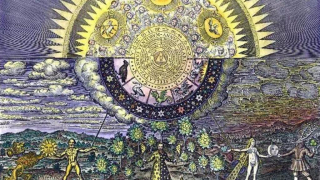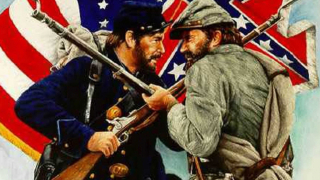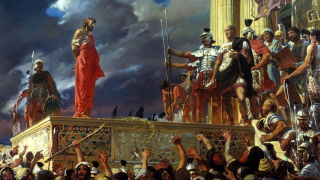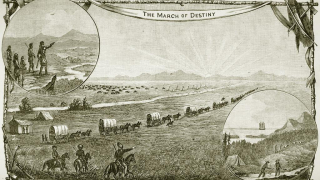The Need for Classes in Society
11.10.2019
We have spoken before about the ideal of Yankee America that all people be at least of middle-class status. We did not delve too deeply into the reasons why this is a bad idea at the time, but we will do so now. One of the chief arguments against promoting this idea is that it engenders dangerous vices within the hearts of those who hear it: They become unsatisfied with what they have and envious of what others have that they do not. Jeremy Beer speaks to this in his warnings about destroying old inherited social classes and replacing them with a fluid, classless society where positions are open to all, and who is hired is determined by competition amongst the applicants:
Warnings and prophesies against the follies of meritocracy have been voiced since the eighteenth century. Consider Justus Moser’s “No Promotion According to Merit,” published in 1770. Moser, a high government official in Westphalia, was writing in response to reformers’ efforts to create a civil service in which positions would be open to all according to merit, not birth or rank. Moser claims that the only honorable thing to do in the face of a system that distributes offices and honors solely on the basis of merit is to withdraw yourself from consideration, since if you were rewarded, your less honored friends would be humiliated, while if you were passed over, you would be so ashamed and disgraced that it would be utterly destroying.
As long as humans have their “present nature and passions,” says Moser, a system of doling out awards and honors according to merit alone can only produce confusion and resentment. As things stand now, on the other hand, “people can think to their comfort: fortune and not merit has elevated these. . . . But if everything went according to merit, this so necessary comfort would completely disappear, and the cobbler [who] can flatter himself that he would be doing something entirely different from mending the Lady Mayor’s slippers if merit were respected in this world could not possibly be happy.”
Similar warnings were issued by others. In England and America, the case against meritocracy descends clearly from Edmund Burke’s Reflections on the Revolution in France.
Burke begins with the assumption, as do all critics of meritocracy, that there really are natural, meaningful, and generally ineradicable human differences. In ignoring these, Burke warned, the French revolutionaries were propagating a “monstrous fiction, which, by inspiring false ideas and vain expectations into men destined to travel in the obscure walk of laborious life, serves only to aggravate and imbitter that real inequality, which it never can remove; and which the order of civil life establishes as much for the benefit of those whom it must leave in a humble state, as those whom it is able to exalt to a condition more splendid, but not more happy.”
Burke’s assumption about individual differences has, at least in my opinion, been thoroughly confirmed by the psychological research of the last half century. We’ll come back to this, but it certainly seems true that there is “real inequality” among men that can “never” be erased; and that to contend that it can be erased is to inspire false hopes, which when dashed will no doubt lead to bitterness and resentment. For Burke, the old class structure humbled some and exalted others, but by making deliberately obscure the mechanism by which this separation occurred, it allowed the man of low social status to blame his estate not on himself, but on the randomness of birth, and it removed a major source of pride for the man of high social status.
A century and a half later, the Swiss economist Wilhelm Röpke insisted on the same point. It “deserves to be stressed,” he wrote, that if everyone is supposed to have
“the same chances of advancement, those left behind will lose the face-saving and acceptable excuse of social injustice and lowly birth. The weakness of mind or character of the overwhelming majority of average or below-average people will be harshly revealed as the reason for failure, and it would be a poor observer of the human soul who thought that this revelation would not prove poisonous. No more murderous attack on the sum total of human happiness can be imagined than this kind of equality of opportunity, for, given the aristocratic distribution of the higher gifts of mind and character among a few only, such equality will benefit a small minority and make the majority all the unhappier.”
Now, Röpke was no Spencerian social Darwinist who delighted in the social survival of the fittest. As a decentralist and ardent supporter of small-scale and peasant agriculture, Röpke holds much in common with Wendell Berry. But on individual differences and their primary source-nature-Röpke was what I would call a realist.
The same is true, I think, of Berry. In Life Is a Miracle, he assails the meritocratic lie propagated by our schools. In words reminiscent of Burke’s and Röpke’s, he writes:
“Young people are told, “You can be anything you want to be.” Every student is given to understand that he or she is being prepared for “leadership.” All of this is a lie. You can’t be everything you want to be; nobody can. Everybody can’t be a leader; not everybody even wants to be. And these lies are not innocent. They lead to disappointment. They lead good young people to think that if they have an ordinary job, if they work with their hands, if they are farmers or housewives or mechanics or carpenters, they are no good.”
The older Christian view of classes which Mr Beer is touching upon teaches us to appreciate where we are, to be content, to value what is, not what we desire. It teaches each class the duties it must practice towards the others. F. Allan Hanson explains:
In the early Middle Ages the condition of poverty, or being "poor" (pauperes), was not necessarily defined in terms of economic destitution at all. In England and northern France of the 9th and 10th centuries thecategory pauperes referred to free commoners: people who were neither nobles nor clergy. While they were certainly not well off economically, their most distinctive feature was that they did not bear arms. Thus, they stood in need of protection. This was the duty of the king and men at arms in France, while in England the king was bound to protect them against "knightly violence" (Mollat 1986: 95, 98-99, 296; Hyams 1980: 261-62).
Even as poverty became associated with economic hardship, it was not viewed as a social pathology. To the contrary, the poor formed an intrinsic part of an organic society, the three orders or estates of which--warriors, clergy, poor agricultural and other workers--were thought to reflect the order of heaven (Duby 1980: 3-4). Thus around the year 1000 people had a "mental image of a society one and triune like the divinity who had created and would ultimately judge it" (p. 5).
Given the divine origin of the social order, the poor were not held individually responsible for their condition. Prosperity and poverty alike were attributed to the grace of God, and all should accept their lot with humility. Nor were the poor stigmatized. If anything they were thought to be morally superior to the rich, particularly if they had voluntarily renounced secular wealth and power. Monks, nobles, and wealthy persons would wash the feet of the poor and invite them to dine. St. Louis, King of France in the 13th century, cut bread and poured drink himself for the paupers whom he fed at his own table. In a society that condemned this-worldly things, the poor represented a religious ideal. Moreover, they were downright useful to the rich and powerful as an outlet to atone for their sins through the Christian charity of alms-giving (Geremek 1994: 7, 17-20, 42; Waxman 1977: 73-77; Mollat 1986: 44).
--'How Poverty Lost Its Meaning’, p. 3, https://academic.mu.edu/phil/jonesj/courses/HOPR140Hanson_HowPovertyLostItsMeaning.pdf , via Pravmir, http://www.pravmir.com/not-yours-but-you-almsgiving-in-the-modern-age/
The modern American way of life, i.e., mercilessly trampling over each other in an attempt to climb the economic ladder, is far from the Christian ideal. Mr Hanson’s words are quite illuminating, but let us hear the even loftier words of the Golden-Mouthed, of St John Chrysostom. In commenting on certain verses in 1 Timothy 6, St John says,
Having said, They think that godliness is a means of gain, he adds: But godliness with contentment is great gain, not when it possesses wealth, but when it has it not. For that he may not despond on account of his poverty, he encourages and revives his spirit. They think, he says, that godliness is a means of gain, and so it is; only not in their way, but in a much higher. Then having demolished theirs he extols the other. For that worldly gain is nothing, is manifest, because it is left behind, and does not attend us, or go along with us at our departure. Whence is this plain? Because we had nothing when we came into this world, therefore we shall have nothing when we depart from it. For nature came naked into the world, and naked she will go out of it. Therefore we want no superfluities; if we brought nothing with us, and shall take nothing away with us.
Ver. 8. And having food and raiment, let us be therewith content.
Such things, and so much ought we to eat, as will suffice to nourish us, and such things should we put on, as will cover us, and clothe our nakedness, and nothing more; and a common garment will answer this purpose. Then he urges them from the consideration of things here, saying,
Ver. 9. But they that will be rich; not those that are rich, but those who wish to be. For a man may have money and make a good use of it, not overvaluing it, but bestowing it upon the poor. Such therefore he does not blame, but the covetous.
They that will be rich fall into temptation and a snare, and into many foolish and hurtful lusts, which drown men in destruction and perdition.
He has justly said, they drown men, since they cannot be raised from that depth. In destruction and perdition.
. . . Let us then flee from this root of all evils, and we shall escape them all. The love of money, he says, is the root; thus says Paul, or rather Christ by Paul, and let us see how this is. The actual experience of the world testifies it. For what evil is not caused by wealth, or rather not by wealth, but by the wicked will of those who know not how to use it? For it is possible to use wealth in well doing, and even through means of it to inherit the kingdom. But now what was given us for the relief of the poor, to make amends for our past sins, to win a good report, and to please God, this we employ against the poor and wretched, or rather against our own souls, and to the high displeasure of God. For as for the other, a man robs him of his wealth, and reduces him to poverty, but himself to death; and him he causes to pine in penury here, but himself in that eternal punishment. Are they equal sufferers, think you?
What evils then does it not cause! What fraudulent practices, what robberies! What miseries, enmities, contentions, battles! Does it not stretch forth its hand even to the dead, nay, to fathers, and brethren? Do not they who are possessed by this passion violate the laws of nature, and the commandments of God? In short everything? Is it not this that renders our courts of justice necessary? Take away therefore the love of money, and you put an end to war, to battle, to enmity, to strife and contention. Such men ought therefore to be banished from the world, as wolves and pests. For as opposing and violent winds, sweeping over a calm sea, stir it up from its foundations, and mingle the sands of the deep with the waves above, so the lovers of wealth confound and unsettle everything. The covetous man never knows a friend: a friend, did I say? He knows not God Himself, driven mad, as he is, by the passion of avarice. Do you not see the Titans going forth sword in hand? This is a representation of madness. But the lovers of money do not counterfeit, they are really mad, and beside themselves; and if you could lay bare their souls, you would find them armed in this way not with one or two swords, but with thousands, acknowledging no one, but turning their rage against all; flying and snarling at all, slaughtering not dogs, but the souls of men, and uttering blasphemies against heaven itself. By these men all things are subverted, and ruined by their madness after wealth.
For whom indeed, whom I should accuse, I know not! It is a plague that so seizes all, some more, some less, but all in a degree. Like a fire catching a wood, that desolates and destroys all around, this passion has laid waste the world. Kings, magistrates, private persons, the poor, women, men, children, are all alike affected by it. As if a gross darkness had overspread the earth, no one is in his sober senses. Yet we hear, both in public and private, many declamations against covetousness, but no one is mended by them.
What then is to be done? How shall we extinguish this flame? For though it has risen up to heaven itself, it is to be extinguished. We have only to be willing, and we shall be able to master the conflagration. For as by our will it has got head, so it may be brought under by our will. Did not our own choice cause it, and will not the same choice avail to extinguish it? Only let us be willing. But how shall that willingness be engendered? If we consider the vanity and the unprofitableness of wealth, that it cannot depart hence with us, that even here it forsakes us, and that while it remains behind, it inflicts upon us wounds that depart along with us. If we see that there are riches There, compared to which the wealth of this world is more despicable than dung. If we consider that it is attended with numberless dangers, with pleasure that is temporary, pleasure mingled with sorrow. If we contemplate aright the true riches of eternal life, we shall be able to despise worldly wealth. If we remember that it profits nothing either to glory, or health, or any other thing; but on the contrary drowns men in destruction and perdition. If you consider that here you are rich, and hast many under you, but that when you depart hence, you will go naked and solitary. If we often represent these things to ourselves, and listen to them from others, there will perhaps be a return to a sound mind, and a deliverance from this dreadful punishment.
--Homily 17, http://www.newadvent.org/fathers/230617.htm
Yankeefied America may boast that she is the ‘leader of the free world’, but any society that lusts after money to the degree that it does is in no way free. Truly, this one who initiated the world into the horrible ritual of Black Friday stampedes is more enslaved than anyone else in the world:
The South once lived better than this. At one time she did have a mature class structure with noblesse oblige, etc. But all that was swept away in the aftermath of the War of Northern Aggression. Now she is just as much ensnared in the chase for wealth as her Yankee cousins.
Yet all is not lost. The various States have the Christian past described above that can inspire them to better deeds, and the leaven of Orthodox churches and monasteries is present among them. And, glory to God, there are even whole bodily relics of saints on the soil of some: St Alexis in Pennsylvania, St John the Wonderworker and St Seraphim Rose in California, St Herman in Alaska. Through their holy prayers and the example of the simplicity of their holy lives, we hope a better day will dawn in the South and in all the States, a day in which the ugly waves of the fallen passions are calmed, and contentment with one’s lot in life is the rule rather than the exception.














